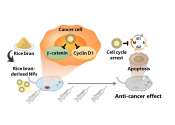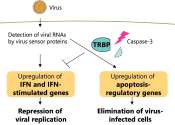Reintroduced gray wolf found dead in Larimer County, Colorado
One of 10 gray wolves reintroduced to Colorado in December was found dead in Larimer County, the U.S. Fish and Wildlife Service confirmed.

One of 10 gray wolves reintroduced to Colorado in December was found dead in Larimer County, the U.S. Fish and Wildlife Service confirmed.
Plants & Animals
Apr 24, 2024
0
50

Taiwan was shaken by dozens of earthquakes overnight and into Tuesday that left buildings swaying and some tilting, with the government saying they were aftershocks from a huge deadly quake that hit the island more than two ...
Environment
Apr 23, 2024
0
9

Several types of conventional cancer therapies, such as radiotherapy or chemotherapy, destroy healthy cells along with cancer cells. In advanced stages of cancer, tissue loss from treatments can be substantial and even fatal. ...
Bio & Medicine
Apr 22, 2024
0
51

Taiwan's capital was hit by a series of earthquakes overnight into the early hours of Tuesday, with the Central Weather Administration saying the strongest was a magnitude-6.3 tremor originating in eastern Hualien.
Environment
Apr 22, 2024
0
35

Researchers have revealed the regulatory mechanism of a specific protein that plays a key role in balancing the immune response triggered by viral infections in mammal cells. These findings could help drive the development ...
Cell & Microbiology
Apr 18, 2024
0
20

Dubai's major international airport diverted scores of incoming flights on Tuesday as heavy rains lashed the United Arab Emirates, causing widespread flooding around the desert country.
Environment
Apr 16, 2024
0
2

From online abuse to threats of sexual violence, harassment of New Zealand's parliamentarians is on the rise, and becoming increasingly disturbing, University of Otago research shows.
Social Sciences
Apr 16, 2024
0
6

Lysosomes are surrounded by a lipid bilayer that separates the acidic environment and the digestive enzymes of the organelle from the cytoplasm. Damage to this layer—lysosomal membrane permeabilization, or LMP for short—can ...
Cell & Microbiology
Apr 8, 2024
0
17

A 7.4 magnitude earthquake has rocked the east coast of Taiwan—the largest the island nation has seen in more than 25 years.
Earth Sciences
Apr 4, 2024
0
87

When cells in the human body divide, they must first make accurate copies of their DNA. The DNA replication exercise is one of the most important processes in all living organisms and is fraught with risks of mutation, which ...
Cell & Microbiology
Mar 29, 2024
0
131
Death is the permanent termination of the biological functions that define a living organism. It refers to both a particular event and to the condition that results thereby. The true nature of the latter has for millennia been a central concern of the world's religious traditions and of philosophical enquiry. Many religions maintain faith in either some kind of afterlife or reincarnation. The effect of physical death on any possible mind or soul remains for many an open question.
Animals almost without exception (see hydra) die in due course from senescence. Intervening phenomena which commonly bring death earlier include malnutrition, predation, disease, accidents resulting in terminal physical injury, or, in extreme circumstances, grave ecosystem disruption. Intentional human activity causing death includes suicide, homicide, and war. Roughly 150,000 people die each day across the globe. Death in the natural world can also occur as an indirect result of human activity: an increasing cause of species depletion in recent times has been destruction of ecological systems as a consequence of the widening spread of industrial technology.
Death in this context is now seen as less an event than a process: conditions once considered indicative of death are now reversible. Where in the process a dividing line is drawn between life and death depends on factors beyond the presence or absence of vital signs. In general, clinical death is neither necessary nor sufficient for a determination of legal death. A patient with working heart and lungs determined to be brain dead can be pronounced legally dead without clinical death occurring. Precise medical definition of death, in other words, becomes more problematic, paradoxically, as scientific knowledge and technology advance.
This text uses material from Wikipedia, licensed under CC BY-SA